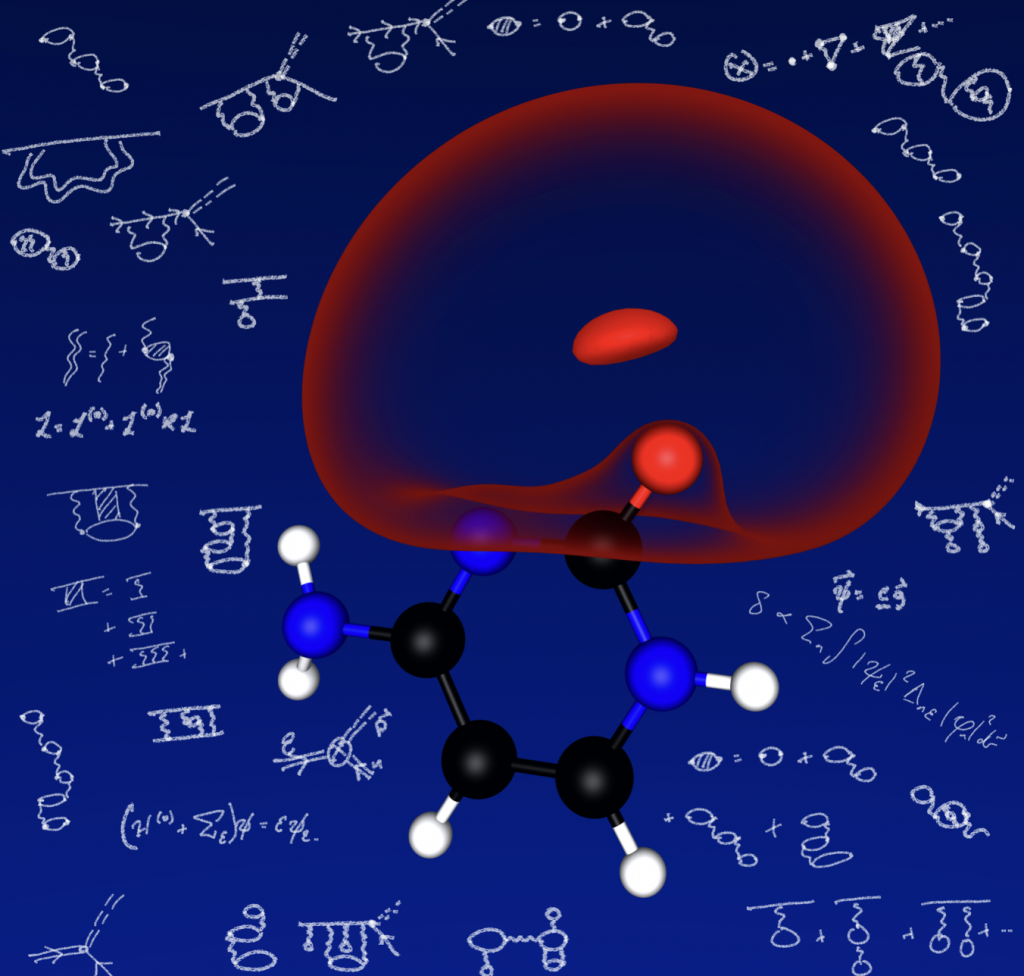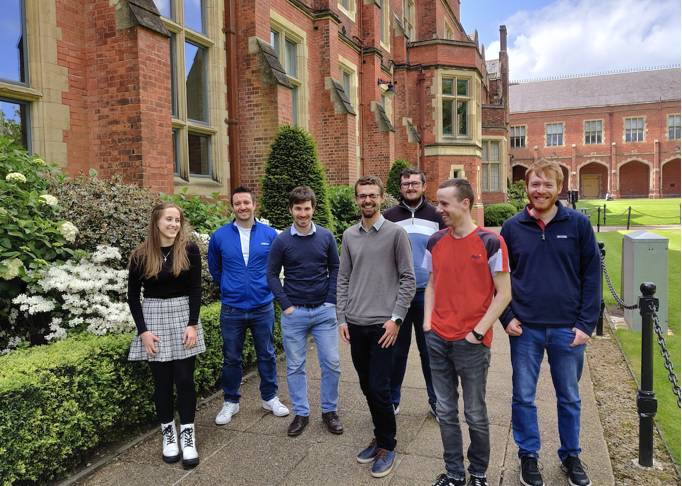Topics:
The overarching theme of my group’s research has been to tackle complicated/formidable quantum many-body problems, describing experiment and making predictions for real systems. Our primary interest is in developing theory and computational approaches to describe low-energy antimatter interactions with atoms and molecules; other topics include:
- atomic and molecular diagrammatic many-body theory;
- theory of low-energy antimatter (positron and positronium) interactions with atoms and molecules;
- theory of atomic and molecular collisions;
- quantum chaos;
- theory of ultraintense-laser matter interactions.
- computational quantum many-body physics & quantum chemistry, including development of B-spline and Gaussian basis approaches, ab initio GW/Bethe-Salpeter methods and beyond.
Selected highlighted publications
Many-body theory calculations of positron scattering and annihilation in H2, N2 and CH4,
C. M. Rawlins, J. Hofierka, B. Cunningham, C. H. Patterson and D. G. Green
arXiv:2303.02083, Phys. Rev. Lett. 130, 263001 (2023) [open access]
Positron annihilation and binding in aromatic and other ring molecules
E. Arthur-Baidoo, J. R. Danielson, C. M. Surko, J. P. Cassidy, S. K. Gregg, J. Hofierka, B. Cunningham, C. H. Patterson, D. G. Green, arXiv:2311.13066, Phys. Rev. A 109, 062801 (2024); Editors’ Suggestion.
Many-body theory for positronium-atom interactions,
D. G. Green, A. R. Swann, and G. F. Gribakin, Phys. Rev. Lett. 120, 183402 (2018)
γ-ray spectra and enhancement factors for positron annihilation spectra with core-electrons
D. G. Green and G. F. Gribakin, Phys. Rev. Lett. 114, 093201 (2015).
Transverse spreading of electrons in high-intensity laser fields
D. G. Green and C. N. Harvey, Phys. Rev. Lett. 112, 164801 (2014).
Preprints/under review
- Many-body theory and Gaussian-basis implementation of positron annihilation gamma-ray spectra on polyatomic molecules,
S. K. Gregg, J. P. Cassidy, A. R. Swann, J. Hofierka, B. Cunningham, D. G. Green, arXiv:2502.12364 (2025). - Many-body theory calculations of positron binding to parabenzoquinone,
S. K. Gregg, J. Hofierka, B. Cunningham, D. G. Green, arXiv:2502.10327 (2025). - Gaussian-basis many-body theory calculations of positron binding to negative ions and atoms
J. Hofierka, B. Cunningham, C. M. Rawlins, C. H. Patterson, and D. G. Green
arXiv:2311.13066 - B-Spline basis Hartree-Fock method for arbitrary central potentials: atoms, clusters and electron gas
D. T. Waide, D. G. Green and G. F. Gribakin, arXiv:2108.05850 (under review). - Self annihilation of confined positronium, A. R. Swann, D. G. Green and G. F. Gribakin, arXiv:2108.01966.
- Positron annihilation with core and valence electrons,
D. G. Green and G. F. Gribakin, arXiv:1502.08045.
Many-body theory/antimatter interactions with atoms and molecules
Positron annihilation and binding in aromatic and other ring molecules
E. Arthur-Baidoo, J. R. Danielson, C. M. Surko, J. P. Cassidy, S. K. Gregg, J. Hofierka, B. Cunningham, C. H. Patterson, D. G. Green, arXiv:2311.13066, Phys. Rev. A 109, 062801 (2024); Editors’ Suggestion.
Many-body Theory Calculations of Positron Binding to Halogenated Hydrocarbons
J. P. Cassidy, J. Hofierka, B. Cunningham, C. M. Rawlins, C. H. Patterson, and D. G. Green
arXiv:2303.05359, Phys. Rev. A (Letter) 109, L040801 (2024).
Many-body theory calculations of positronic-bonded molecular dianions
J. P. Cassidy, J. Hofierka, B. Cunningham, C. M. Rawlins, and D. G. Green,
J. Chem. Phys. 160, 084304, Emerging Investigators Special Collection 2024 [highly-selective annual issue], and JCP Featured article.
Many-body theory calculations of positron binding to hydrogen cyanide
J. Hofierka, B. Cunningham and D. G. Green,
The European Journal of Physics D 78, 37 (2024).
Many-body theory calculations of positron scattering and annihilation in H2, N2 and CH4,
C. M. Rawlins*, J. Hofierka*, B. Cunningham, C. H. Patterson and D. G. Green (*) joint-first authors
arXiv:2303.02083, Phys. Rev. Lett. 130, 263001 (2023) [open access]
Many-body theory for positronium scattering and pickoff annihilation in noble-gas atoms,
A. R. Swann, D. G. Green, G. F. Gribakin, arXiv:2105.06749, Phys. Rev. A 107, 042802 (2023) [Open Access]
Positron cooling via inelastic collisions in CF4 and N2 gases,
A. R. Swann and D. G. Green, arXiv:2105.06904, Phys. Rev. Lett. 130 033001 (2023).
Many-body theory of positron binding in polyatomic molecules
J. Hofierka, B. Cunningham, C. M. Rawlins, C. H. Patterson, D. G. Green, Nature 606, 688 (2022) [open access].
BSHF: A program to solve the Hartree–Fock equations for arbitrary central potentials using a B-spline basis,
D. T. Waide, D. G. Green, G. F. Gribakin, Comput. Phys. Commun. 250, 107112 (2020).
Many-body theory for positronium-atom interactions,
D. G. Green, A. R. Swann, and G. F. Gribakin, Phys. Rev. Lett. 120, 183402 (2018)
Probing positron cooling in noble gases via annihilation γ spectra,
D. G. Green, Phys. Rev. Lett. 119, 203404 (2017).
Positron cooling and annihilation in noble gases,
D. G. Green, Phys. Rev. Lett. 119, 203403 (2017).
Comment on “Gamma-ray spectra from low-energy positron annihilation processes in molecules,
D. G. Green and G. F. Gribakin, Phys. Rev. A 95, 036701 (2017).
γ-ray spectra and enhancement factors for positron annihilation spectra with core-electrons
D. G. Green and G. F. Gribakin, Phys. Rev. Lett. 114, 093201 (2015).
Positron scattering and annihilation on noble gas atoms
D. G. Green, J. A. Ludlow, G. F. Gribakin, Phys. Rev. A 90, 032712 (2014).
Positron scattering and annihilation in hydrogen-like ions
D. G. Green, G. F. Gribakin, Phys. Rev. A 88, 032708 (2013).
Effect of positron-atom interactions on the annihilation gamma spectra of molecules,
D. G. Green, S. Saha, F. Wang, G. F. Gribakin and C. M. Surko, New. J. Phys. 14, 035021 (2012).
“Calculation of gamma spectra for positron annihilation on molecules”,
D. G. Green, S. Saha, F. Wang, G. F. Gribakin, and C. M. Surko, Mat. Sci. Forum 666, 21 (2010).
Ultraintense laser-plasma interactions
(my close collaborator and friend in this work, Chris Harvey, who was a Research Fellow of similar age, is deceased).
SIMLA: Simulating laser-particle interactions via classical and quantum electrodynamics
D. G. Green and C. N. Harvey, Comput. Phys. Commun. 192, 313(2015).
Transverse spreading of electrons in high-intensity laser fields
D. G. Green and C. N. Harvey, Phys. Rev. Lett. 112, 164801 (2014).
“Numerical modelling of Compton scattering in ultra-intense laser pulses”,
C. N. Harvey and D. G. Green, J. Phys. Conf. Ser. 594, 012052 (2015).
Atomic and Molecular collisions, cold molecules and quantum chaos
The approach to chaos in ultracold atomic and molecular physics: statistics of near-threshold bound states for Li+CaH and Li+CaF
M. D. Frye, M. Morita, C. L. Vaillant, D. G. Green, Jeremy M. Hutson
Phys. Rev. A 93, 052713 (2016)
Quantum chaos in ultracold collisions between Yb(1S0) and Yb(3P2)
D. G. Green, C. L. Vaillant, M. D. Frye, M. Morita, J. M. Hutson
Phys. Rev. A 93, 022703 (2016).
Chapters in Books
D. G. Green and G. F. Gribakin, Enhancement factors for positron annihilation on valence and core orbitals of noble-gas atoms. In: Y. Wang, M. Thachuk, R. Krems, and J. Maruani (eds.), Concepts, Methods and Applications of Quantum Systems in Chemistry and Physics, Progress in Theoretical Chemistry and Physics, vol. 31 (Springer, 2018), pp. 243-263. arXiv:1703.06980 ; Original publication
Other publications
A Quantised Cyclin-Based Cell Cycle Model
C. Emerson, L. Bennie, N. M. Byrne, D. G. Green, F. J. Currell, J. A. Coulter,
Journal of Biotechnology and Biomedicine, accepted (2023).

